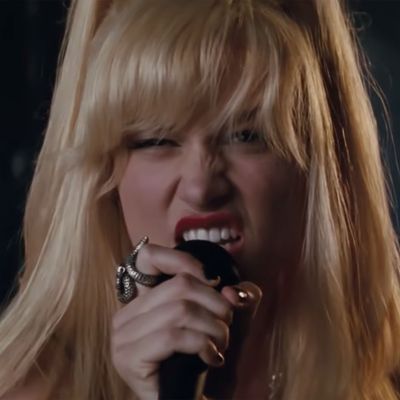
This week is the tenth anniversary of Edgar Wright’s Scott Pilgrim vs. the World, and Edgar Wright won’t let you forget it. Scott Pilgrim is a zillion types of movie: It’s a comic-book movie, based on Bryan Lee O’Malley’s graphic novels. It’s a video-game movie, filling its action scenes with power-ups and 8-bit imagery years before Ready Player One was even a glimmer in Spielberg’s terribly misguided eye. It’s an end-of-the-aughts Manic Pixie Dream Girl movie, a zippy comedy, and that most rarefied of things, a Toronto movie where Toronto actually is Toronto and not a stand-in for somewhere else. On top of it all, it’s a music movie, centered around a bunch of delightfully scrappy fictional bands (Sex Bob-omb, Crash and the Boys) in a delightfully real local indie scene (Lee’s Palace! Sonic Boom!). The fight scenes are intertwined with musical set pieces: Evil Ex No. 1, Matthew Patel, fights Scott (Michael Cera) with slant rhymes and backup dancers. The Katayanagi Twins summon battle monsters out of their subwoofers. The final boss is a smarmy record exec played by Jason Schwartzman.
Scott Pilgrim is either an “extremely your shit” or an “extremely the opposite of your whole entire concept of your shit” sort of movie, but it’s hard to resist the charms of its musical high point, Brie Larson’s performance as Envy Adams. Envy is the front woman of a popular band called Clash at Demonhead, and is also Scott’s ex. Scott and Ramona (Mary Elizabeth Winstead) go to a Clash at Demonhead concert, where Scott realizes Envy’s new boyfriend, alpha vegan bassist Todd (Brandon Routh) is also one of Ramona’s (evil) exes. After being talked up through the entire first half of the movie, Envy Adams has to live up to the audience’s expectations of her as one of those girls who’s so cool it’s scary, who of course would have stomped all over dweeby Michael Cera’s heart. Larson delivers, exuding cool in a ridiculous platinum wig, little black dress, and red boots; shouting “OH YEAH” so loud it fills the screen with big, angry comic-book letters. Despite Larson’s own music career (lol, lol, lol), the song, called “Black Sheep,” is by Toronto band Metric, fronted by IRL cool girl Emily Haines, whom Envy Adams was based on. But in the film, those vocals are Larson’s own, layered overtop Metric’s rerecording of the song for the movie. The overall effect cements Clash at Demonhead as one of the best fictional rock bands of all time — up there with Something She and Crucifictorious — with the song making sense both emotionally in the context of the movie and just as a jam on its own.
When Larson sings, “Hello again, friend of a friend,” it comes across like a stone-cold threat, even if the rest of the lyrics that follow are, by Haines’s own admission, just stream-of-consciousness stuff that sounds cool. The lyrics may be free association, but the menacing vibes are clear as day: She’s sending you her love on a wire, and that wire is barbed. Wright makes his cuts along to the propulsive thrum of the bass, whiplashing between Envy’s glare, Scott’s confusion, Ramona’s defensive front, and … whatever Brandon Routh is doing. It’s Metric by way of the Yeah Yeah Yeahs, and stands out for sounding way crisper than so much of the soundtrack (though I do have a soft spot for Sex Bob-omb’s “Garbage Truck,” which features the poetic lyrics: “You know you wanna ride / On my garbage truck / Truck! Truck! Truck!”). It’s a song to practice your sexy strut and your revenge glower to, by yourself, in your apartment, away from the windows.
As a bonus recommendation, I’d be remiss not to share the song Scott Pilgrim was named after, the 1998 single “Scott Pilgrim” by Canadian indie act Plumtree, whose logo you can see on the character’s signature yellow-and-red ringer tee. It’s four futch girls singing about an unrequited crush, with a timelessly catchy power-pop hook, and we wouldn’t have Envy Adams without it. The dream of the ’90s is alive in Scott Pilgrim’s thoroughly 2000s Toronto.


